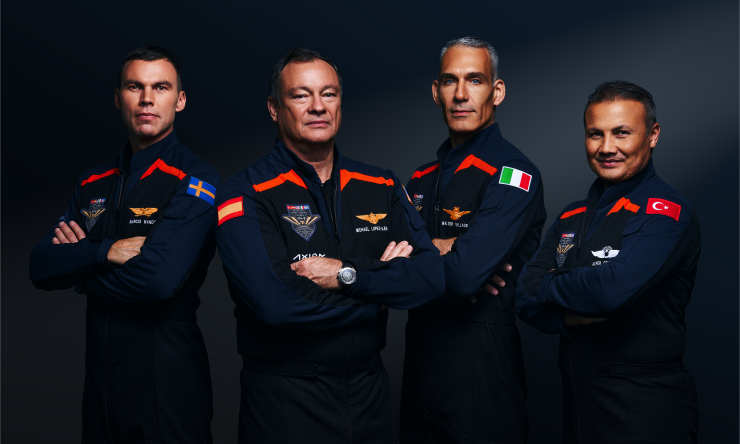TRISH to study spaceflight effects on genome and nervous system on Axiom Space's Ax-3 Mission
The Translational Research Institute for Space Health (TRISH) will conduct a suite of human health and performance research projects during Axiom Space’s upcoming (Ax-3) to the International Space Station (ISS), scheduled to launch in 2024. TRISH is a consortium led by Ďă¸Ű6şĎżŞ˝±˝áąű’s Center for Space Medicine with partners California Institute of Technology and Massachusetts Institute of Technology.
The selected research projects are designed to enhance understanding of the human experience in space and inform the development of high-impact scientific and technological solutions to help humans thrive on future space missions. Each project is part of TRISH’s commercial spaceflight health research program, Enhancing eXploration Platforms and Analog Definition (EXPAND). The projects are led by researchers from across the nation who will investigate key space health topics, including space motion sickness, sleep disturbance, genome alterations, changes to cognitive function and eye and brain health.
“Our commercial spaceflight partners such as Axiom Space are instrumental to cutting-edge research, including these projects designed to reveal how the human body and mind function in the extreme environment of space,” said Dr. Emmanuel Urquieta, TRISH chief medical officer, EXPAND program lead and assistant professor in the Center for Space Medicine at Baylor. “This work represents an important step in our journey to understand the body's response to challenging conditions, which is critical for improving human health both here on Earth and on future long-duration missions, including to the Moon and Mars.”
Ax-3 is the third commercial astronaut mission to the ISS. The Ax-3 crew will live and work aboard the ISS for up to 14 days, implementing a full mission comprising microgravity research, educational outreach and technology demonstrations. The four-person crew includes Commander Michael LĂłpez-AlegrĂa, Pilot Walter Villadei, and Mission Specialists Alper Gezeravcı and Marcus Wandt. A SpaceX Falcon 9 rocket will launch the Ax-3 crew aboard a SpaceX Dragon spacecraft to the ISS from NASA’s Kennedy Space Center in Florida.
“Axiom Space appreciates the continued partnership with TRISH on our commercial astronaut missions and the opportunity to further our knowledge of human health through rigorous scientific studies,” said Lucie Low, chief scientist for microgravity research at Axiom Space. “TRISH’s growing database of medical information collected from commercial spaceflight participants provides additional data sets that can help to inform the expanding commercial space industry.”
The TRISH EXPAND biomedical research projects for Ax-3 include:
Cognitive and Physiologic Responses in Commercial Space Crew on Short-Duration Missions, Mathias Basner, M.D., Ph.D., M.S., University of Pennsylvania Perelman School of Medicine
Spaceflight participants experience a multitude of stressors that can affect brain function and crew performance. Basner’s team will track spaceflight participants’ performance in memory, abstraction, spatial orientation, emotion recognition, risk decision-making and sustained attention before and after the mission to assess the mental impact of space travel.
Otolith and Posture Evaluation II, Mark Shelhamer, Sc.D., Johns Hopkins University
Many space travelers develop motion sickness, nausea and disorientation shortly after launch and landing, which can impact performance. Using a series of tests administered on a tablet device, Shelhamer will study how astronauts’ inner ears and eyes sense and respond to motion before and immediately after spaceflight to better predict who is likely to develop space motion sickness.
Space Omics + BioBank, Richard Gibbs, Ph.D., Ďă¸Ű6şĎżŞ˝±˝áąű
Gibbs’ team will gather biological specimens from astronauts before and after their mission to assess the effects of spaceflight on the human body at the genomic level. Comparisons of the pre- and post-flight samples can yield critical insights into the impact of space travel on human health and advance health care on Earth by revealing alterations in gene expression in response to extreme environmental stressors.
SANS Surveillance, TRISH
Understanding Spaceflight Associated Neuro-Ocular Syndrome (SANS), which involves changes to the eyes and brain during spaceflight, is of critical importance to NASA. This project collects related ocular images and vision function data during the ground phases of the mission.
Standardized research questionnaires, TRISH
TRISH has implemented a set of standardized research questionnaires for the crew to collect data on their sleep, personality, health history, team dynamics and immune-related symptoms. These additional contextual and qualitative data points will become part of TRISH’s EXPAND research database, which collects and stores pre-flight, in-flight and post-flight health data from commercial astronauts in a centralized research database, available to current and future scientists exploring space health.
Sensorimotor adaptation, TRISH
The ability to stand, balance and have full body control will be critical elements when astronauts return to the moon. TRISH collects data before and after flight to help understand the level of sensorimotor ability and change as well as time to recovery.
“TRISH is thrilled to continue our work in advancing human health in space with the help of Axiom Space,” said Jimmy Wu, TRISH senior biomedical engineer, EXPAND program lead and instructor in Baylor’s Center for Space Medicine. “The Axiom team and spaceflight participants are helping us make strides in understanding the risks to human health during space travel.”
Led by Ďă¸Ű6şĎżŞ˝±˝áąű’s Center for Space Medicine, TRISH is a consortium that includes partners Caltech and MIT. NASA recently awarded the Institute a six-year extension to further its work by delivering disruptive solutions to mitigate biomedical risks for human exploration while advancing terrestrial health technologies. Learn more about TRISH at bcm.edu/spacehealth.


 Credit
Credit